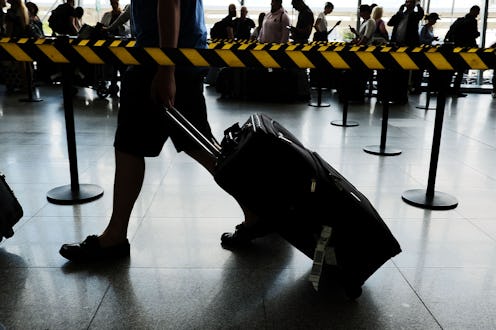News
A Court Just Ruled Trump's Latest Travel Ban Can Go Into Effect — Sorta

Like the two travel bans that came before it, President Trump's third order barring travelers from Muslim-majority countries from coming to the United States was challenged in court. And a federal appeals court ruled Monday that this latest travel ban can take effect, in part, after being blocked by a lower court—as has also happened before. People from the affected countries who have connections to the United States still will be allowed to enter, however.
President Trump issued the latest order on Sept. 24, before the Supreme Court was set to hear arguments on the previous version of the ban. The Supreme Court removed the case from its calendar and asked each side of the case to file additional briefs once the new travel ban was announced, but U.S. District Judge Derrick Watson in Hawaii placed a temporary block on the updated version. Watson said the order “makes no finding that nationality alone renders entry of this broad class of individuals a heightened security risk to the United States.”
Reversing Watson's decision, California's 9th U.S. Circuit Court of Appeals ruled Monday that the ban may go into effect for travelers from Iran, Libya, Syria, Yemen, Somalia, and Chad who do not have connections to the United States. People from North Korea and Venezuela also are barred, because travel restrictions on those nations weren't challenged in the lawsuit.
When the third ban was temporarily blocked a month ago, immigration advocates were thrilled, but knew their fight might not be over. "The whole path has been kind of unpredictable. But one thing is for sure — any time an obstacle is in place, the Trump administration keeps pushing forward," Elizabeth Beavers, Indivisible policy manager, told Bustle at the time.
The Trump administration argues that the travel bans are a necessity for national security, while those in opposition say it's discriminatory to ban people simply for coming from Muslim-majority countries. Justice Department spokeswoman Lauren Ehrsam told Reuters after Monday's ruling: “We are reviewing the court’s order and the government will begin enforcing the travel proclamation consistent with the partial stay. We believe that the proclamation should be allowed to take effect in its entirety."
Monday's decision is essentially the same as the Supreme Court's ruling in June allowing the second travel ban to partially take effect before it heard arguments in the case. SCOTUS allowed the Trump administration to ban travelers from the six countries initially listed who didn't have a "bona fide relationship with a person or entity in the United States," including refugees.
At the time, a "bona fide relationship" was defined as a parent, spouse, child, son-in-law, daughter-in-law, or sibling living in the U.S., as well as a documented relationship with a university or business. Grandparents and fiancees didn't originally qualify, but were later accepted. Grandchildren, aunts, uncles, nieces, nephews, cousins, brothers-in-law, and sisters-in-law in the states weren't accepted.
Unlike the previous travel bans that were only for 90 days, the latest version will last indefinitely. The 9th Circuit's decision to allow parts of it into effect is only temporary, however, as the appeals court will hear oral arguments on the case in December and issue a more permanent ruling.
At the same time, a lawsuit was filed last week in Seattle challenging the ban on refugees looped into the travel ban. The plaintiffs include a Somali refugee whose wife and children won't be allowed to live in the U.S. with him if the ban is upheld. The Trump administration resumed the refugee program on Oct. 24, but said processing for people from 11 countries would be delayed. A 90-day review is now in the works to scrutinize the vetting process for the Middle Eastern and African countries still temporarily barred.